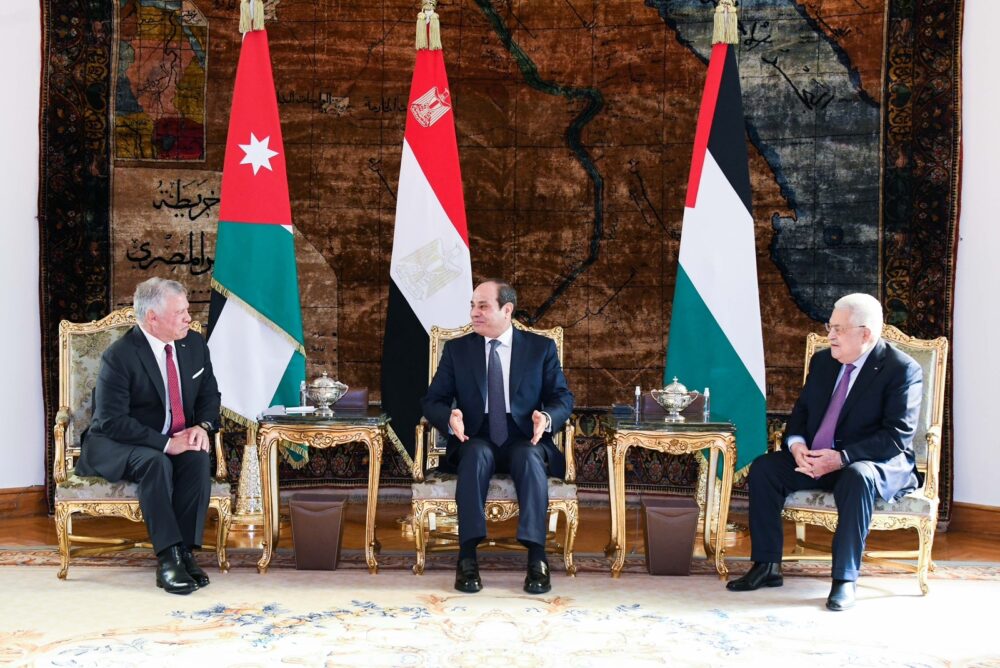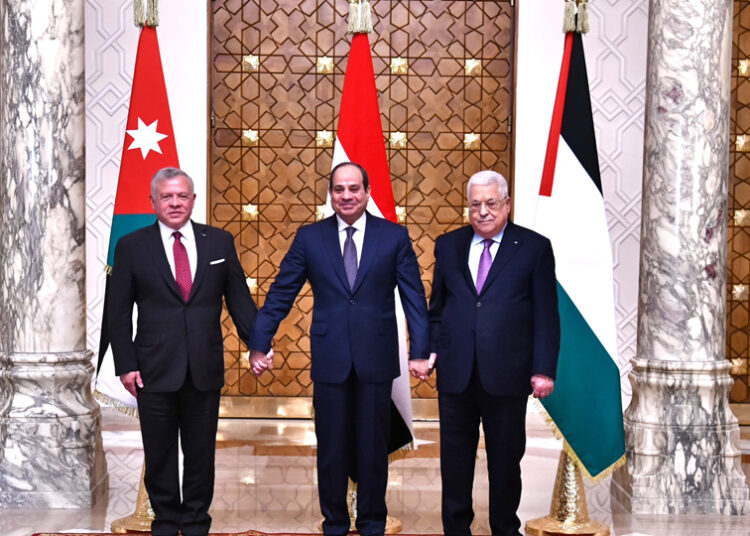Egypt’s President Abdel Fattah El Sisi on Tuesday hosted in a tripartite summit King Abdullah II of Jordan and Palestinian President Mahmoud Abbas in Cairo to discuss developments in the Palestinian cause in light of the current developments in the occupied territories and the related regional and international situations.
During their meeting, the three leaders stressed the necessity of preserving the legitimate Palestinian rights and the continuation of their joint efforts to achieve a comprehensive, just and lasting peace based on the two-state solution, which embodies the independent and sovereign Palestinian state on the lines of June 4, 1967, with East Jerusalem as its capital, in accordance with international law and relevant international legitimacy resolutions.

President Sisi and King Abdullah II reiterated their full support for the efforts of Palestinian President Abbas in this delicate time the Palestinian cause is going through amidst increasing regional and international challenges.
The leaders stressed the need for the international community to provide protection for the Palestinian people and their legitimate rights and to join efforts to find a real political horizon that would re-launch serious and effective negotiations to resolve the Palestinian issue on the basis of the two-state solution. They also warned of the danger of continued absence of a political solution and its repercussions on security and stability.
They underlined the need to stop all illegal unilateral Israeli measures, which undermine the two-state solution and chances of achieving a just and comprehensive peace. These illegal Israeli measures include expansion of settlements, confiscation of Palestinian lands, home demolitions, the displacement of Palestinians from their homes, the continuous Israeli incursions into Palestinian cities, and the violation of the historical and legal status quo in Jerusalem and its sanctities.
They stressed the need to preserve the existing historical and legal status of Jerusalem and its Islamic and Christian sanctities, in a manner that guarantees respect for the fact that Al-Aqsa Mosque is a pure place of worship for Muslims, and that the Department of Endowments of Jerusalem and the Affairs of the Blessed Al-Aqsa Mosque affiliated to the Jordanian Ministry of Waqfs, Islamic Affairs and Holy Sites, is the only authority mandated to manage the affairs of the Al-Aqsa Mosque and access to it.
President Sisi and Palestinian President Abbas also stressed the importance of the historical Hashemite Custodianship over Islamic and Christian holy places in Jerusalem and its role in protecting these sanctities and their Arab, Islamic and Christian identity.
The leaders stressed the need to unify Palestinian ranks and end division, which is an interest and necessity for the Palestinian people, because of its impact on the unity of the Palestinian position and its solidarity in defending its cause.
They also highlighted the need to take serious and effective measures to alleviate the deteriorating living conditions of the Palestinian people in the Gaza Strip.
King Abdullah II and President Abbas praised the Egyptian efforts to maintain calm in Gaza Strip, while reaffirming the responsibility of international donors in the efforts to rebuild the Strip.
The leaders stressed the importance of the international community’s continued support to the United Nations Relief and Works Agency for Palestine Refugees (UNRWA) and the need to provide the financial support it needs to continue providing vital services to Palestinian refugees in accordance with its UN mandate, especially in light of the important humanitarian and development role the agency plays in favour of the Palestinian people.
The leaders agreed to continue intensive consultation and coordination as part of the Egyptian-Jordanian-Palestinian tripartite coordination formula at all levels.
This comes in order to crystallise a vision to activate efforts to resume negotiations, and to work with brothers and partners to revive the peace process, according to the approved terms of reference, within the framework of efforts to help the Palestinian people obtain their legitimate rights, foremost of which is his right to freedom, independence and a sovereign state on his national soil on the basis of the two-state solution.






Discussion about this post